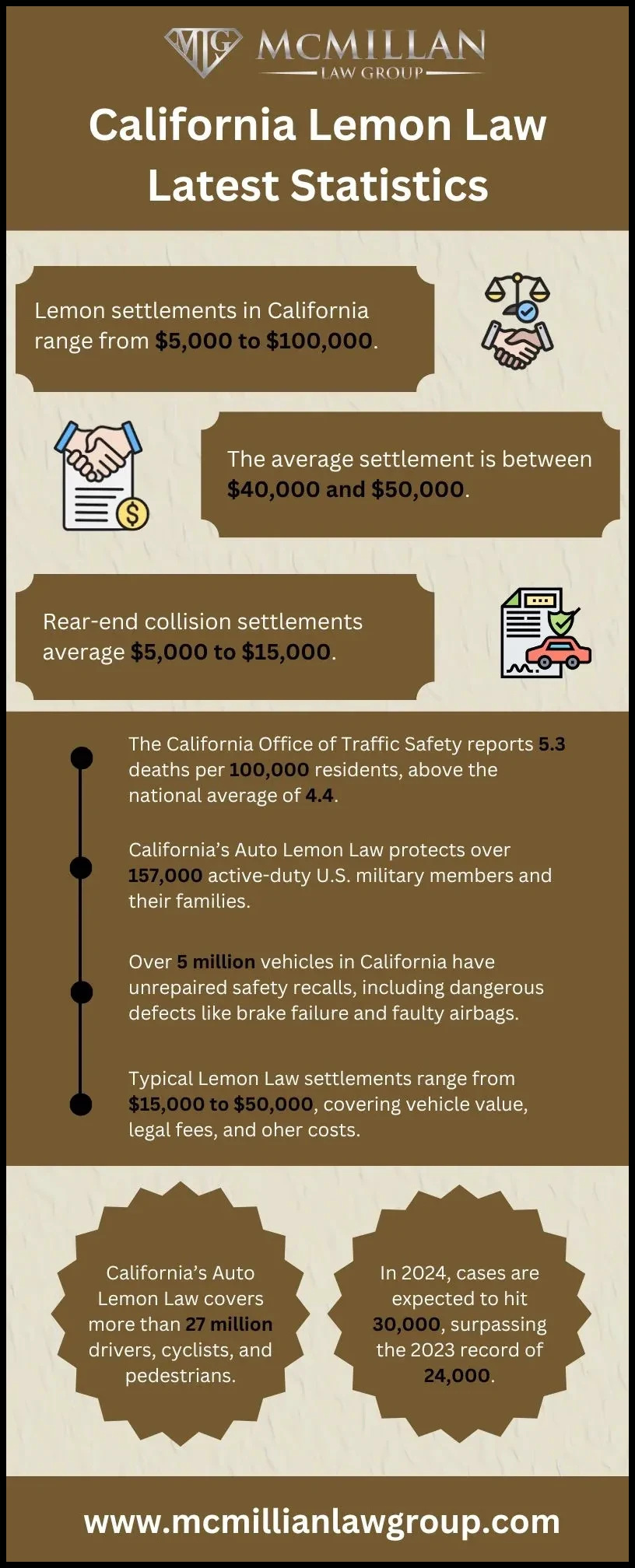The California Lemon Law is an important consumer protection law that helps individuals who have purchased or leased a defective vehicle in California. It provides several remedies to consumers, such as a refund or replacement of the vehicle, plus reimbursement of certain costs they may have incurred.
Under the California Lemon Law, a vehicle is considered a lemon if it has a defect or condition that substantially impairs its use, value, or safety, and the manufacturer is unable to repair it after a reasonable number of attempts. The Lemon Law also covers defects in leased vehicles, as long as the lease is for at least four months. Individuals who believe their vehicle may be a lemon should contact an experienced Lemon Law attorney to discuss their rights and potential remedies.
Under the law, if a manufacturer is unable to repair a consumer’s good after a reasonable number of attempts, they must replace or refund the consumer’s money for the defective product.
The lemon car law in California specifically applies to vehicles that are under warranty.
The Requirements for a Lemon Law Claim
In California, the lemon law applies to vehicles that meet certain requirements. To qualify as a lemon, your vehicle must:
- Existing warranty. The vehicle must have been purchased with an express and active warranty.
- Purchase from dealer or manufacturer. The lemon law covers “consumer goods,” not cars purchased from private parties.
- A reasonable amount of attempted repairs. The manufacturer or dealer has to have been given the opportunity to attempt to repair the vehicle on several occasions.
- Material defect. The problem with the vehicle must be considered material, meaning that it substantially alters the vehicle’s ability to function.
Additionally, the defects cannot be the result of regular wear and tear or the owner’s failure to properly maintain the vehicle. If you are unsure if your vehicle defect qualifies under California’s lemon law, it is best to consult with an experienced attorney.
Eligible Vehicles Under California Lemon Law
The California Lemon Law protects consumers who have purchased or leased certain new and used vehicles. Eligible vehicles must have been purchased or leased in California and must have been used primarily for personal, family, or household purposes. Eligible vehicles include cars, trucks, vans, motorcycles, recreational vehicles, and off-road vehicles.
The Lemon Law does not apply to vehicles purchased for commercial or business purposes. In order for a vehicle to qualify for Lemon Law protection, it must have a significant defect that substantially impairs its use, value, or safety, and must have been the subject of a manufacturer’s repair attempts a reasonable number of times.
If your vehicle qualifies under California Lemon Law, you may be entitled to a refund, replacement vehicle, or cash compensation.
How the California Lemon Law Applies to Electric Cars
The California Lemon Law provides significant consumer protections for electric cars, including vehicles that are leased or purchased. If a consumer’s electric car does not meet the standards of performance and reliability that were outlined in the original purchase agreement, they may be able to receive a refund or a replacement vehicle.
The law applies to any defect that substantially impairs the use, value, or safety of the vehicle, and the manufacturer or dealer is responsible for the repair costs. If the problem is not resolved after a reasonable number of attempts, the consumer may be eligible for a refund or replacement.
In addition, the manufacturer is responsible for refunding all the costs associated with the purchase or lease of the vehicle, including taxes, finance charges, and other fees. The California Lemon Law is a valuable resource for electric car owners, providing important protection and support.
Electric cars are covered by the lemon law in California. The state has some of the most comprehensive lemon laws in the country, and EV lemon law claims have been filed in recent years. If you purchase a defective electric vehicle, you are entitled to a refund or the vehicle can be replaced at the manufacturer’s expense, but you must prove that it’s a lemon according to California law. You must also have made a reasonable number of attempts to have the vehicle repaired before filing a claim in court.
Generally, electric vehicles are considered to be safe. However, this doesn’t mean that an individual electric car can’t have a manufacturing defect. A recent Insurance Institute for Highway Safety (IIHS) report says that electric vehicles are at least as safe as conventional vehicles, and insurance data shows that EV injury claims are substantially less frequent than for gas vehicles.
In conclusion, the California Lemon Law is an important consumer protection statute that provides rights and remedies to individuals who have purchased or leased a defective vehicle. If you believe that you have a lemon vehicle, it is important to understand the lemon law requirements and your potential remedies before making a claim. Working with an experienced lemon law attorney can help you determine if you have a viable claim and can assist you throughout the process.




